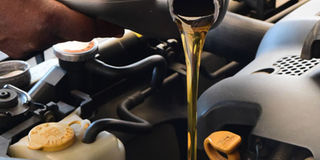Common maintenance mistakes to avoid

What you need to know:
Besides the obvious cost implications, motorists have obligations that can sometimes prevent them from maintaining their cars as stated in the owner’s manual. To help you prioritise and plan, here are some mistakes a person can make and what you can do to avoid them.
The care you give to your car does not only determine how long it will last but also how it performs.
Michael Ojok, a motorist, argues that many motorists will continue to drive a car until it totally breaks down. This, according to Ojok, indicates a laxity in getting to know when your next service is due.
“If you do not follow your recommended service schedules, you will subject some of your car parts to wear and tear and in the long-run, cause other parts to wear out faster as well,” Ojok explains.
The urge to save money
Most, if not all motorists, wish to save money when it comes to motor vehicle servicing. If it is not by taking long to service your car, it could be buying the cheapest spare parts, something that Eric Amadi, a mechanic, says is common.
For instance, there are motorists who would rather top up (mixing old and new engine oil) their engine oil instead of having old oil extracted from the engine and replaced with new oil to give the engine a new lease of life.
“However, a motorist should know that if you use engine oil that was not prescribed for your engine, it will run normally but will not function at its optimal best. If you buy cheap brake pads, you will end up buying many pairs within a short time compared to a motorist who buys durable ones that last longer,” Amadi advises.
Self-diagnosing
According to Manina Mutwalib Gudoi, a mechanic, much as Google may give you answers to everything you search for, it may not delve into complicated mechanical issues such as a blown fuse, let alone fix it. “Your car may make noise while braking and you zero down to old brake pads yet it is the brake disc that is out of shape and requires replacing or resurfacing. It is, therefore, important to seek help from an experienced mechanic for issues you do not understand,” Gudoi says.
Ignoring dashboard lights
A number of lights appear on your dashboard, most of which are easy to interpret. One of these is the check engine light. According to Fredrick Kabogoza, a motorist, when these lights appear on your dashboard, it could mean that your engine is misfiring or overheating.
“Check engine lights sometimes show up and disappear. This does not mean everything is okay. It is advisable to visit a mechanic to ascertain what the problem is and have it fixed to avoid causing further mechanical issues,” Kabogoza advises.
Preferring cheaper options
Kabogoza cautions that cheaper car spare parts in most cases become expensive in the long run. For instance, if you buy used car tyres because they still look new, you will not know how long they served the previous user and why they replaced them.
Comprehensive fluid inspection
According to Carused.jp, an online portal, some car owners make the mistake of thinking that they should only check and change their motor oil. While it is one of the most important fluids in your car, there are other fluids that should regularly be inspected, changed, and/or topped off. The portal recommends that after inspection, you should get your engine coolant, transmission fluid, brake fluid, and power steering fluid serviced.
Not changing your wipers
According to toyotaofgreenville.com, windshield wipers degrade over time, no matter what. Change your wipers as soon as they do not clear the windshield well.
Neglecting a wheel alignment
Eric Amadi, a mechanic, says this can be a simple thing to overlook because you can drive for quite a while without getting an alignment or rotating your tyres. Misaligned wheels can and will result in real issues. There is only one way to be positive that your tyres are properly aligned, and that is to have your vehicle’s alignment checked by a service centre. “If a wheel alignment is recommended, it is in your best interest to have it performed. As for tyre rotation, most manufacturers recommend that tyres be rotated every 5,000 to 10,000 miles, but check your owner’s manual to make sure of the proper recommended range,” he says.




